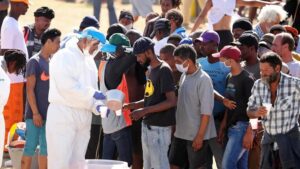 Treasury Secretary Steven Mnuchin convened G7 Finance Ministers, the International Monetary Fund and the World Bank to coordinate responses to the COVID-19 pandemic. In April, the G7 supported the G20 to implement a plan to suspend debt payments for the 73 poorest countries in the world through 2020.
Treasury Secretary Steven Mnuchin convened G7 Finance Ministers, the International Monetary Fund and the World Bank to coordinate responses to the COVID-19 pandemic. In April, the G7 supported the G20 to implement a plan to suspend debt payments for the 73 poorest countries in the world through 2020.
“The G7 called for debt payments to be suspended beyond 2020 and now into next year for the world’s poorest countries,” stated Eric LeCompte, Jubilee USA Executive Director and United Nations debt expert. “Developing countries need more debt relief to fight the serious health and economic impacts of the coronavirus.”
By year-end, the suspension of debt payments could free up $12 billion for low-income countries to invest in health services and economic recovery. The Finance Ministers encouraged all G20 countries to fully participate in the debt payment freeze.
“The G7 is pressuring China to fully implement the debt payment suspension and agree to extend the debt payment freeze into 2021,” said LeCompte. “Unfortunately, the G7 took no action to compel the private sector to participate in the debt payment suspension or extend debt relief to more developing countries.”
When the debt payment suspension began, the private sector was encouraged to participate. However, much of the private sector resisted participation. In July, G20 Finance Ministers released a statement with stronger private sector participation language, but still fell short of offering a plan to ensure participation.
Many developing countries reeling from the worst economic impacts of the crisis do not qualify for current debt relief plans because they are classified as “middle-income” countries.
“Beyond expanding relief and aid to more countries, we need to permanently reduce debts for many developing countries during this severe global crisis,” noted LeCompte. “Emergency aid can be delivered to countries by accessing global reserve funds or what’s known as the Special Drawing Rights.”
The Ministers also discussed improving transparency for global debt data, distribution of vaccines for low-income countries and growing economic crisis in Lebanon.


